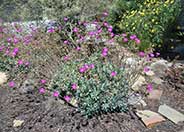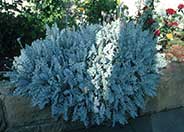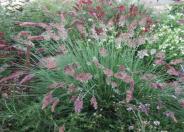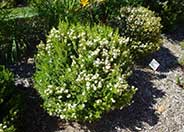
Common name:Rock Purslane
Botanical name:Cistanthe grandiflora 'Jazz Time'
This perennial will grow 12"-36" and produces large blue-green rosettes that last for a long season. It produces large, silky, lavender pink flowers that have lime-green, purple spotted calyces.

Common name:Delta Fusion Crapemyrtle
Botanical name:Lagerstroemia indica 'Delta Fusion'
Delta Fusion has the perfect combination of dark burgundy foliage and re-blooming hot pink blooms. This small tree or hedge (8-12') is an excellent low water choice. Foliage color does not fade in hot summer sun. Deciduous. Attracts pollinators, summer and fall blooming, heat tolerance, longer blooming, reblooming. Great for an accent, cottage style or informal, hedge, mass planting and privacy planting. Established plants need low water. It does best in full sun with well draining soil. Use slow-growth fertilizer in late winter, before spring growth. Prune to desired shape and size in late winter.

Common name:Dusty Miller
Botanical name:Centaurea cineraria
This perennial plant won't grow more than 1' tall and has large, silvery/white leaves with blue, purple, or yellow flowers that bloom in summer.

Common name:Ruby Grass
Botanical name:Melinis nerviglumis
A small semi-evergreen cool-season grass from S. Africa that forms a tidy 1 foot tall clump. It has blue-green foliage that turns purplish-red in the fall and showy pink flowers that rise a foot above the foliage in the spring and summer with spent flowers still attractive into winter. Best in full sun with regular water in a well-drained soil but tolerates considerable periods without irrigation and near seaside conditions.

Common name:Compact Myrtle
Botanical name:Myrtus communis 'Compacta'
This evergreen shrub is 6' high and 5' wide with aromatic leaves. It blooms with white, sweet-scented flowers followed by bluish black berries. It can be grown in sun or partial shade; well drained soil is essential. 'Compacta' has smaller leaves and is often used for edges and low formal hedges.
Designer: Susan Morrison
Photographer: Vicki Anderson
Incorporate compost 6" into your soil to retain water, reduce compaction, feed earthworms, and provide valuable nutrients to your plants.
Check the soil's moisture level before watering.
You can reduce your water use 20-50% by regularly checking the soil before watering.
Develop healthy soil for plants that are vigorous and naturally pest-resistant.